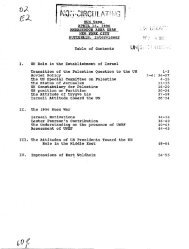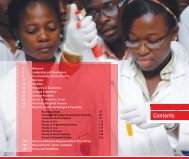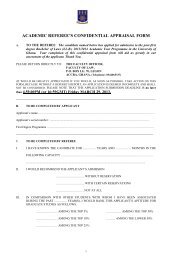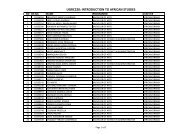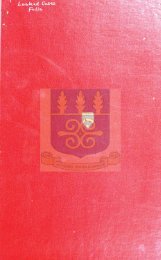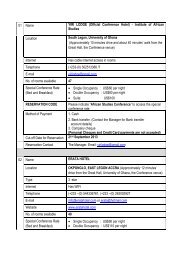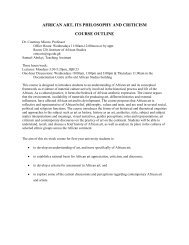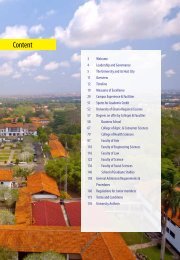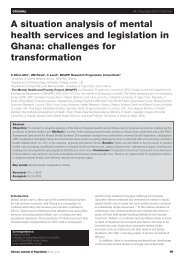View/Open - UGSpace - University of Ghana
View/Open - UGSpace - University of Ghana
View/Open - UGSpace - University of Ghana
- No tags were found...
Create successful ePaper yourself
Turn your PDF publications into a flip-book with our unique Google optimized e-Paper software.
(QUjiiwciili) <strong>of</strong> ( $k« m
LANDLORDS AND BROKERS!A WEST AFRICAN TRADING SYSTEM(With a note on KumasiButchers)<strong>University</strong> <strong>of</strong> <strong>Ghana</strong>,Legon.May 1965.
jjandlords and Brokers: A West African Trading SystemByPolly " i l lIn his important article "The Social Organization <strong>of</strong> Credit in aTest kfr J oan Crttle Market" (Africa, January 1965), Dr. Abner Cohenexamined the mechanism <strong>of</strong> Ibadan cattle market mainly in terms <strong>of</strong>the roles <strong>of</strong> the chief permanent functionaries <strong>of</strong> the market, the"l'ndlords". In this summary article I am concerned firstly togeneralise about the Yfest African "landlord system <strong>of</strong> long-distancetrade"; secondly to provide a l i t t l e comparative material relatingto an important cattle market, Kumasi, where the traditional creditgrantingsystem has broken down; and thirdly to raise some pointsabout the changing organisation <strong>of</strong> Hausa butchers, again with specialreference to Kumasi. As my enquiries in Kumasi cattle market werepart <strong>of</strong> a general study <strong>of</strong> the landlord system, I shall not excusemyself for the brief duration <strong>of</strong> my stay in Kumasi in connexion with1this fieldwork, but I must emphasise that my knowledge <strong>of</strong> the workings<strong>of</strong> Kumasi cattle market is very superficial compared with Dr. Cohen's<strong>of</strong> the market in Ibadan.Research on settled, urban, immigrant communities, such as theHausa in Ibadan, has been grossly neglected up to date: there hasbeen l i t t l e realisation <strong>of</strong> the extent to which,in their ethnicdiversity, West African cities resemble compressed countryside.^(Social anthropologists have preferred rural areas; economists dohardly any non-statistieal fieldwork; political scientists have failedto appreciate the significance <strong>of</strong> permanently encapsulated urbansocieties; and urban sociologists are trained inappropriately).Considering this general gap in our knowledge and the fact that M.S.Smith whose work was confined to Zaria Provinee, is effectively theonly source^" on the socio-economic organization <strong>of</strong> the Hausa in1. I visited the Kumasi cattle market eleven times in April and May19&4-. I am most grateful to Mohammed Shehu for his assistancethere on each occasion,2. But before going to Kumasi for this work I had had the advantage<strong>of</strong> learning about the organisation <strong>of</strong> Ibadan Cattle market fromDr. Cohen at first hand, so that I had some idea <strong>of</strong> what to lookfor, I was also somewhat familiar with the cattle markets atAccra and Zaria.3. Jean Rouch in his well-known article "Migration au <strong>Ghana</strong>, 1953-55",Journal de la Soejete des Africanistes. Vol. XXVI, 1956, referred tothe super-tribalisation <strong>of</strong> the migrants in the cities <strong>of</strong> <strong>Ghana</strong>, butno one else has seriously followed up his pioneering work.k. See, in particular, The Economy <strong>of</strong> Hausa Communities <strong>of</strong> Zaria.Colonial Research Studies No.lb, HMSO, 1955. In this remarkablework, which cannot be read too <strong>of</strong>ten, Dr. Smith does not happento mention the institution <strong>of</strong> landlord, as distinct from that <strong>of</strong>broker ( d i l l a l i ) , though there are many oaltle landlords in Zaria.
Hausalsnd, the publication <strong>of</strong> Dr. Cohen's general findings on thesocial organization <strong>of</strong> the five thousand immigrant Hausa <strong>of</strong> Ibadanis indeed eagerly awaited. It a&s because the cattle landlordshave dominated the He.usa quarter <strong>of</strong> Ibadan ver since its foundationin 1916, that he was obliged to study the cattle market so intensively,as part <strong>of</strong> a much wider whole.The various roles <strong>of</strong> the Ibadan cattle landlords (in Hausa knownas mai gjda) are dealt with very adequately by Dr. Cohen. In a generalway, taking Dr. Cohen's article as read, I would briefly define a5landlord as a settled stranger, who makes i t his business toaccommodate long-distance stranger-traders and to assist them inselling, and usually in storing, their goods. If a landlord operatesin a market - which he does not necessarily do, for (as will be seen)many landlords' houses resemble small wholesale markets - then he isalso a d i l l a l i (or broker), a Hausa word <strong>of</strong> Arabic origin, signifyinga formally recognised intermediary between buyer and seller.The West African landlord system is especially associated,historically, with the long-distance trades in livestock (sheep andgoats, as well as cattle) and in kola. But the dozens <strong>of</strong> landlordsfound nowadays in cities like Kumasi or Accra, or in towns like Keta,entertain traders in many other types <strong>of</strong> storable produce, such asgrains and groundnuts. Some <strong>of</strong> these landlords specialise in receivingstranger-traders who handle certain types <strong>of</strong> produce only, for instanceLiopti fish from the river Niger; others receive strangers <strong>of</strong> certainethnic origin only; others, again, will accommodate any travellingtrader. Although the system is traditionally associated with longdistancenorthern Muslim traders engaged in the north-south trade,there have been, for the past few decades at least, some Ewe, Yorubaand other southern landlords in places like Accra, or Keta.There is no general literature on the West African landlord systemand I certainly failed to realise the significance <strong>of</strong> the institutionwhen first noticing its existence in Kumasi and Accra in 1962.^ Shortlyafterwards one had been excited by the appearance <strong>of</strong> "Landlord andStranger: Change in Tenancy Relations in Sierra Leone"^ by V.R.Dorjahnand C. Fyfe, which is partly concerned with the history <strong>of</strong> the landlordsystem in our sense, the earliest reference to i t being dated I846.5i In a few regions, such as Hausaland, landlords may be natives, whosebusiness i t is to receive long-distance traders who are also natives.6, See the entry "Landlords" in a glossary <strong>of</strong> African markets containedin my article "Markets in Africa", The Journal <strong>of</strong> Modern AfricanStudies. Vol. l,'No.4.7, The Journal <strong>of</strong> African History. Vol. I l l , No.3.
One's interest in this ancient system <strong>of</strong> indigenous international tradehaving "been aroused, one gradually came across stray references to i tQin many sources, <strong>of</strong> which the earliest, so far, is Clapperton in Kano.9Certainly the literature on long-distance cattle marketing in WestAfrica adequately supports the conclusion that the landlord system isstandard throughout most <strong>of</strong> the savannahcommon, i f not universal, in the forest zone.zone"'"'"' and i t is presumablyThe landlords outside Hausaland are nearly a l l settled strangers.If a landlord has not inherited his position from his father, then he islikely to have been a long-distance trader himself, one who made such asuccess <strong>of</strong> his business that he was enabled to buy, build, or rent, ahouse large enough for the accommodation <strong>of</strong> other strangers. Landlordslike to give the appearance <strong>of</strong> having retired from active trading - <strong>of</strong>being older statesmen above the fray: thus do they enhance the dignity<strong>of</strong> their neutrality as brokers. Rules <strong>of</strong> etiquette loom largely in the .lives <strong>of</strong> landlords, who must never, for instance, be observed at home insocial intercourse with a cattle buyer or butcher. But as well as beingneutral they are apt to be heavily involved, in various ways which Ishall now discuss.Dr. Cohen strongly emphasises the importance <strong>of</strong> the fact that eachlong-distance trader has his regul-.r landlord to whom he <strong>of</strong>ten remainsattached for years and this stability is a general feature <strong>of</strong> the landlordsystem, whatever commodity i^ay be involved and represents a highly-developedform <strong>of</strong> the reciprocal regular-customer relationship which is <strong>of</strong> suchgeneral importance in West African market trading, both wholesaling and8, Clapperton mentioned that in connexion with long-distance trade "the name<strong>of</strong> the dylala, or broker, was "written inside every parcel". If, then,the goods were found to be <strong>of</strong> inferior quality, "the dylala must find outthe seller, who, by the laws <strong>of</strong> Kano, is forthwith obliged to refund thepurchase money". (Quoted from West African Explorers, ed. C.Howard, TheWorld's Classics, p.250.). Other writers to mention brokers or landlords(besides H.G.Smith and the sources listed in the next footnote) include:L.Binger, Du Niger au Golfe de Guinee. Paris, 1892; S.F.Nadel, (who inA Black Byzantium, p.330, notes the existence <strong>of</strong> guilds <strong>of</strong> dilali (sic);C. H.Robinson, Hausaland, London, I896, p.123; and P.Staudinger in LmHerzen der Haussalander, Berlin, 1889, p.613. See also footnote 17.9, This includes: H.Barth, Travels and Discoveries in North and CentralAfrica. 1857 (See Vol.II. p.309, on livestock marketing at Kukuwa);D. Danset, La Commercialisation du Betail et de la Viande du Niger(eye10styled, 1964): Marguerite Dupire, "Trade and Markets in theEconomy <strong>of</strong> the Nomadic Fulani <strong>of</strong> Niger", being chapter 12 in Marketsin Africa, ed. P.Bohannan and G.Dalton, as well as other writings by thesame author; G.I.Jones, "The Beef-Cattle Trade in Nigeria", Africa,January 1946; and J.Robin, "Le Marbat Marche au Betail de Louga", Africa,April, 1945 (Louga is in Senegal).10. Though I was informed that there are some cattle markets in Upper Volta.without landlords.11. The literature is remarkably scanty. A cyclostyled (though unpublished)report, (MIG/61/4), issued by CCTA in connexion with a conference onmigration held in Niamey in 1961, makes i t clear that the cattlemarketing system at Bouake in the Ivory Coast is based on brokers, knownas coxeurs.
- k -12retailing. But although in Kumasi cattle market, the name <strong>of</strong> eachtrader's landlord is so well-known as to he automatically recordedagainst his (the trader s) name in the <strong>of</strong>ficial record <strong>of</strong> cattlearrivals at the market, yet both there and in Ibadan, landlordscompete vigorously for old as well as now business, even to the extent<strong>of</strong> sending agents to Kali to advertise their good name.Successful cattle landlords, with many strangers attached to them,are very prosperous people. When asked how i t is that they can affordto entertain their strangers so lavishly, providing them with threefree meals a day and other entertainment, sometimes for several weeks,they always say that the la'ada (or commission on sales) is theironly remuneration. Dr. Cohen notes that in Ibadan the landlord retainsonly about 7s from the total commission <strong>of</strong> 13s (per head <strong>of</strong> cattle)which is collected from the buyer on the conclusion <strong>of</strong> the sale and i tis the landlord who gives his stranger a present on his departure - notvice versa. I am sure that in monetary terms the la'ada is trivial -i t is a mere witness fee. How, then, is the prosperity <strong>of</strong> the landlordsto beexplained?I suggest that, most importantly, the landlord should be seen asthe organiser <strong>of</strong> the distribution <strong>of</strong> the largesse bestowed by his stranger.The stranger is apt to spend part <strong>of</strong> his takings on the purchase <strong>of</strong> goods,and traders and others who benefit from introductions effected by thelandlord may give him a commission. Lorry park collectors should bespecially mentioned in this connexion, for they readily admit to sharingtheir takings from departing strangers with the landlord.^ ThroughoutWest Africa (former French as well as former British) there is an indigenoussystem <strong>of</strong> lorry park organisation (<strong>of</strong> which in colonial timesgovernments took no cognisance) under which a l l fares are received onbehalf <strong>of</strong> lorry owners by collectors, who load the lorries and generallyregulate traffic and who are paid a commission on the total sum collected,12. Women traders speak <strong>of</strong> their suppliers, as well as their customersproper, as "regular customers".13. I doubt whether in Kumasi the landlord usually formally shares hiscommission, which is only 5s., with others. When visiting Abakalikicattle market in Eastern Nigeria, in April 1965, I was informed thatla'ada was 12s., made up as follows: 5s for the mai gida; 3s for thecattle seller; Is 6d returned to the cattle buyer "for chop"; Isfor the cattle seller's boy"; Is for the Hausa chief in Abakaliki(who is not in the cattle trade); 6d for the mosque. In addition,the 10s per head levied at Veterinary Control Posts on a l l beastsentering the. Eastern Region (this being usually, in fact, collectedat markets) is claimed by the seller from the buyer, so that effectively,as informants insisted, la'ada was £1. 2s.14. It was when a Kumasi lorry park collector volunteered that he sharedhis commission with the landlord who directed the departing strangerto the lorry park, that I first became aware <strong>of</strong> the landlord institution.
- 5 -which in <strong>Ghana</strong> and Nigeria is 2s. in the £. Outside Hausaland, thesecollectors are apt to be stringers. They resemble the landlords,also, in not being appointed by the market, or lorry perk, authority -nowadays the local council, I suggest, following Cohen's analysis <strong>of</strong>landlords as patrons, that in many districts those collectors should beregarded as, in origin, lorry park dillr.li - clients who are expected15to hand over part <strong>of</strong> their takings to their pr.tron-lmdlord.Although the landlord's special relationship with his strangeris supposed to preclude him from having any similar relationships withbuyers, I am sure that in fact (and this is ny second point) landlords<strong>of</strong>ten receive direct financial benefits from buyers. This may takethe form <strong>of</strong> a hidden commission on purchases, or <strong>of</strong> paying theirstranger less than the buyer's price.^ Landlords <strong>of</strong>ten assist buyersin practical ways, for instance by arranging transport on credit andnaturally they are "thanked" for this financially, perhaps by bothparties.Thirdly I was told that landlords, though themselves normallysedentary, are sometimes long-distance traders, employing others totravel (or even travelling themselves at times) and that their relationshipswith their strangers provide them with many opportunities <strong>of</strong>promoting their own trading interests, even though, as one may suppose,actual trading partnerships with them are rare. I met a number <strong>of</strong>landlords in Kumasi who were also stationary dealers in the cattlemarket - dealers are defined on page 8 below. (When they buy fromtheir own strangers, a third party acts as intermediary.)15. I am not suggesting that, nowadays, each collector is the client <strong>of</strong> aparticular landlord - though this may have been so in the past. Atlarge lorry parks, collectors are nowadays organised in geographicalgroups under a head-collector, so that in Accra there is a Niameysection (concerned with lorries plying to Niamey), a Kumasi sectionand so forth. A rather unsuccessful attempt has been made to incorporatecollectors in the new <strong>Ghana</strong>ian trade union structure. Insome districts, for instance the Ejura yam growing area <strong>of</strong> <strong>Ghana</strong>,lorry park collectors have developed additional functions, such asthat <strong>of</strong> directing buying stranger-traders to sources <strong>of</strong> supply. TheIboland collecting system appears to be a modification <strong>of</strong> the Hausasystem, the collectors being natives, the revenue being shared withdrivers and transport owners.16. In Niger, according to Danset (op.cit), p.68, there is a rule thatthe d i l l a l i should receive the money from the purchaser in thepresence <strong>of</strong> the seller, but whether this effectively protects theseller is not known.17. In a source quoted on p.415 <strong>of</strong> Les Kolatiers et les Noix de Kolaby A.Chevalier and E.Perrott, Paris, 1911 (a primarily botanicalwork which is nonetheless a most useful source on the kola trade),i t is suggested that brokers sometimes sent out touts in front <strong>of</strong>trading caravans to spread false information among cattle rearerswith the purpose <strong>of</strong> persuading them to accept lower prices.
6 -Fourthly, although tho strangers do not pay for their board andlodging directly, they sometimes,tc their own admission, "dash thoservants" in tfc 3 landlord's house on their departure: these clients,the servants, arc no doubt <strong>of</strong>ten expected to pass part <strong>of</strong> their takingsto the landlord, to assist hLe in meeting his expenses.Fifthly, many landlords nowadays are a species <strong>of</strong> travel agent,advising their stranger on the ever-deepening mysteries <strong>of</strong> exchangecontrol, import licensing and so forth: surely they are paid for thiswork? And there is also their function <strong>of</strong> "banker" - custodian <strong>of</strong>their trader's money wliile he lodges with them.Sixthly, as the Arabian maxim has i t , "the guest is a presentfrom God"."' The more strangers who flock to a landlord/^ the moreprestige he enjoys in his own community.The operation <strong>of</strong> the landlord system may be observed most clearlyin cattle (and sheep) markets and also in connexion with kola marketing.Southern cattle markets like Ibadan and Kumasi, which are situatedoutside the cattle-raising zones, are the most impressive indigenouseconomic organisms in West Africa. It is not just that their annual21turnover is so large, but that they have the capacity to rise to theoccasion when much larger numbers <strong>of</strong> cattle than usual arrive on any22day. The cattle must be sold immediately, not only because many <strong>of</strong>them would otherwise soon die <strong>of</strong> trypanosomiasis, but also because thegrazing areas attached to the markets are so small. The landlords arethe pillars supporting the market structure. But, before concludingthis first section <strong>of</strong> this article, I must refer to another type <strong>of</strong>18. See quotation on page 7.19. Danset (op.cit.) records, p.14, that one day at Ayorou in Niger onelandlord was accommodating 30 cattle-rearers who were selling theiranimals.20. Kola landlords are very numerous in some places: thus Cohen (p.17)records the existence <strong>of</strong> 285 in Ibadan. But partly because kolais <strong>of</strong>ten sold outside markets, so that the market mechanism is moredifficult to study, reliable (detailed) literature on kola marketingis very scanty. Cattle and kola trading are sometimes closely linked.Thus formerly, though not much today, the traders v/ho brought cattlefrom Lagos to Accra (by sea) returned with kola. I found that theorganisation <strong>of</strong> the kola "market" in Bolgatanga in Northern <strong>Ghana</strong>was entirely similar to that <strong>of</strong> a cattle market, though one landlordhad erected the shed and was in sole charge.21. As many as 61,000 cattle were sold in Kumasi in 1963 - an estimatedturnover <strong>of</strong> over £2m. The turnover <strong>of</strong> Ibadan cattle market may beslightly higher - Cohen, p.8, footnote 2. It may be estimated thatherds numbering about a million head are needed to sustain each <strong>of</strong>these markets.22. Nearly a l l the cattle arriving at Kumasi come by lorry, most <strong>of</strong> theimported animals direct from Bawku. (The animals which are drivensouth from Bawku are mainly sold at Prang.) The number <strong>of</strong> lorryloadsarriving daily at Kumasi is extremely variable: the totalrecorded number on the 14 days, 18th April to 1st May, 1964,was 119,as many as 28 <strong>of</strong> which arrived on 28th April.20
landlord altogether - he who, a? it were, operates his own wholesalemarket from Ms house.^est African markets are essentially ephemeral institutions,25 24opening (and closing) periodically and net providing storage facilities.; l i t i e :25Considering how slowly long-distance traders are apt to sell their goods,storage is their main problem and the facilities provided by many lend-26lords are effectively extra-market, especially when the produce isbulky. Wholesale customers buy directly from the landlord's house andthen resell in the market. Such specialised wholesale house-markets willremain an essential adjunct to the market system, until local authorities27realise their responsibility for building storage depots.In much <strong>of</strong> the forest zone <strong>of</strong> West Africa the landlord system has theappearance <strong>of</strong> a Hausa institution, the term mai gida being common currency:in connexion with their widely-flung trading activities many Hausa landlordsestablished themselves far from home and other traders then imitatedthem. It is for the historians to trace the spread <strong>of</strong> the institutionfrom further north. I conclude with a quotation:"The city is merely a temporary depot, situated between theborders <strong>of</strong> the desert and the copiously watered valleys <strong>of</strong> thesouth, and is so completely a town <strong>of</strong> warehouses and docks thatnone <strong>of</strong> its merchants possesses either camel or boat. What part,then, do its people play i f they are neither exporters norimporters? They are brokers, contractors and landlords. "Theguest is a present from God" says an Arabian maxim much in voguein Timbuctoo, where there are no caravansaries. The inhabitant<strong>of</strong>fers gratuitous board and lodging to the stranger merchant forthe first three days and interprets the noble precept in adisinterested and elevated manner The part <strong>of</strong> diatigui orlandlord does not end there; he is expected to instruct thestranger on the current prices, the abundance or scarcity <strong>of</strong>the product he has come to buy or sell, the standing <strong>of</strong> anyclient who may <strong>of</strong>fer himself and also to assist his guest inmaking his purchases, the price <strong>of</strong> lodging thus including thebenefits <strong>of</strong> brokerage." Timbuctoo the Mysterious by Felix Dubois,translated by Diana White, London, 1897, pp.259-60.23. It is only in the very largest centres (<strong>of</strong> which, for instance, thereare only about 6 in <strong>Ghana</strong>), that daily markets are held.24. Except occasionally for yams and then usually in separate small yammarkets which are annexes to general markets. (Most yam storage isundertaken by farmers).25. The extremely slow pace <strong>of</strong> selling is one <strong>of</strong> the major inefficiencies<strong>of</strong> the West African long-distance trading system. In the case <strong>of</strong>credit sales, for instance, i t is usual for the seller to wait forpayment.26. Others besides landlords are obliged to store goods outside markets.There is no proper wholesale maize market in Accra, and many womenmaize wholesalers use their houses for storage.27. Such storage facilities as do exist inside daily markets are usuallybuilt by private traders - though local authorities are increasinglybuilding lock-up "shops" round the edges <strong>of</strong> markets.
Alhaji Idi, a Dagomb: landlord who is tho (un<strong>of</strong>ficial) head <strong>of</strong> theKumasi cattle market, informed me that there were about 40 cattlelandlords (ho referred to them as mai ,c;ida) who work in that market and helisted their names. I checked this l i s t with a i l the landlords I metin the market and I think i t is fairly complete. (As most <strong>of</strong> the28"bringers" whc sell cattle at Kumasi are from Mali, Upper Volta or29Niger, so most <strong>of</strong> the landlords are <strong>of</strong> corresponding nationality).It seemed that about 16 <strong>of</strong> them nere from Mali (<strong>of</strong> whom 11 were Gao),10 were from Upper Volta and 3 were from Niger: <strong>of</strong> the remainder 7were from northern <strong>Ghana</strong> and 4 were Hausa. At least 12 <strong>of</strong> them bore thetitle Alhaji, having made the pilgrimage to Mecca. Landlords are fairly30readily distinguishable in the market by their black umbrellas.In terms <strong>of</strong> the numbers <strong>of</strong> strangersmorethey receive, some landlordsare much^important than others. Thus during the period 25th April to1st May 1964 one landlord was <strong>of</strong>ficially recorded as "receiving" 21 <strong>of</strong>the 74 separate consignments^ and the 7 "largest" landlords received32three-quarters <strong>of</strong> the total. On two days, April 28th and 29th, whenas many as 47 lorriesarrived, one landlord received 14 consignmentsaltogether - and may well have had to seek the help <strong>of</strong> otherlandlordsin accommodating his strangers. Not only is there this concentration<strong>of</strong> business in the hands <strong>of</strong> a few, but the indications are that thel i s t <strong>of</strong> 40 includes many who are in semi-retirement, even though theymay regularly attend the market.Theman who assisted me in the market was a Hausa, born in Kumasi,who denoted himself as a cattle "dealer" - he had previously been adealer in the Kumasi sheep market which is an entirely distinct, thoughsimilarly organised, institution. A dealer may be defined as a stationarytrader who buys cattle, usually directly from bringers, for the purpose <strong>of</strong>reselling them in the market, on cash or credit terms, within at most28. Following usage in the market itself, I define a "bringer" as anyonewho brings cattle to market to sell.29. Only very recently has an attempt been made,for the first time, todistinguish the real country <strong>of</strong> origin <strong>of</strong> imported cattle in the<strong>Ghana</strong>ian trade statistics, so that the respective importance <strong>of</strong>these main sources has not been known. (In 1963, 86% <strong>of</strong> the cattlearriving at Kumasi cattle market were recorded as being imported,the remainder being from northern <strong>Ghana</strong>).30. A few other prominent persons also carry umbrellas.31. All were lorry-loads, save one which arrivod on foot.32. These figures may not be completely accurate as the name <strong>of</strong> ad i l l a l i assistant is sometimes given in place <strong>of</strong> the landlord.
three days. Traditionally, i t is one <strong>of</strong> the functions <strong>of</strong> a landlordto guarantee that tho buyer, who usually buys on credit, ^ will payup within a certain period - up tc 4- weeks in Ibadan, In Kunasi thistraditional system has collapsed and dealers partially f i l l the gap.It was interesting to note that the def.lor who assisted me, who wasan operator in a rather snail way <strong>of</strong> business, was sometimes addressedby his butcher-customers as "mai-gida 1 *.Unfortunately, I ascertained l i t t l e <strong>of</strong> the history <strong>of</strong> the collapse<strong>of</strong> the traditional credit-guaranteeing system, which seems to havefinally occurred less than ten years ago when the new cattle marketand slaughter house were opened in the outskirts <strong>of</strong> Kumasi. However,i t would seem that as Kumasi cattle market grew in importance as thesource from which most <strong>of</strong> the population in southern <strong>Ghana</strong>, outsideAccra, drew its meat supplies, the traditional system was bound tosuffer great strain. Nowadays only about a quarter <strong>of</strong> a l l the cattlewhich pass through the market are slaughtered in Kumasi and most <strong>of</strong> thebuyers (they are mainly butchers, but also traders who resell to butchers)are from elsewhere. Dr. Cohen describes how the Ibadan landlords areobliged to employ boys to observe, as it wore, every financial movement<strong>of</strong> their butcher-customers. Given the number <strong>of</strong> strange buj'ing-faces,this would not, nowadays, be practicable in Kumasi,Then, there is the general question <strong>of</strong> tho relationship betweenlandlords and butchers in the market. While the fact that most butchers35 1are strangers would preclude them from taking concerted hostile actionagainst the landlords (such as that which occurred in the Abeokuta cattlemarket in 1963^), yet the two groups do not trust each other. Also theothnic heterogeneity <strong>of</strong> the Kumasi landlords, considered as a group,would make i t very difficult for them to co-operate with each other inrisk-taking as do the Ibadan landlords.So far as I could ascertain, most dealers in Kumasi market areindividually related to their customers - two dealers may work witheach other, but there is not even that slight general element <strong>of</strong>corporateness that exists with landlords. Dealers deal mainly, butnot exclusively, with regular buying customers. They grant credit, forup to several weeks, to such <strong>of</strong> their customers whom they know and trust33« Credit-sales are common under the landlord system, whatever themerchandise involved.34. He was also regarded, jokingly, as my mai-gida. The friendly taunt"Where is your mai-gida?" welcomed me on several occasions as,rather forlornly, I entered this large, boisterous market.35. See below, page 12.36. Cohen, footnote 2, p.l6.
- 10 -who require i t . If the customer fails to p'.y up then, though mostreluctantly, they nay resort to the courts.^ They ore very volatilefinanciers, sometimes buying and then reselling in the twinkling <strong>of</strong>an eye. They are so numerous and competitive that I can only presume,as other general evidence also suggests, that their trading marginsere usually rather reasonable.But I judge the activities <strong>of</strong> dealers to be generally <strong>of</strong> peripheralimportance. They are, to change the metaphor, s safety v.lve whichprevents the market from exploding when too many cattle arrive. Ithink that a considerable proportion <strong>of</strong> the cattle are bought directlyfrom the bringers by largo butchers and traders whousually, thoughnot invariably, pay cash - unfortunately this statement, which is basedon observation and conversation, cannot possibly be substantiated,there being no means by which a research worker can record the details<strong>of</strong> many transactions which occur simultaneously. If this is correct,the collapse <strong>of</strong> the traditional risk-taking system is closely associatedwith the increased prosperity enjoyed by a minority <strong>of</strong> butchers duringthe last decade.The landlords are concerned only with transactions involving theirbringers and do not intervene when dealers arc reselling. That thela'ada(or commission) is a mere witness fee is borne out by tho factthat dealers, like landlords, receive this fee from the buyer whenreselling, thus reclaiming what they had originally paid to the landlord.West African markets are, traditionally, places which anyone(stranger or native) may enter for direct selling purposes and thistradition survives. Perhaps, this being so, I should not have beenso surprised as I was by the sight <strong>of</strong> a group <strong>of</strong> six Gao bringers who,I was told, habitually sold directly to butchers, without the intervention<strong>of</strong> any landlord. There arc many Gao in Kumasi, and thesefrugal traders prefer, like so many <strong>of</strong> their countrymen, to crowd intoa permanently hired room for cattle men, rather than wasting theirmoney (and theirtime) on landlords.While bringers, like these six Gao, sometimes combine together for39the practical purpose <strong>of</strong> meeting the expenses <strong>of</strong> the journey, I think37. Unlike the Ibadan landlords, Cohen, p.1838. Thus a special section for "villagers" who are not regular tradersbut who wish to retail their produce directly, was opened recentlyat Kumasi Central Market.39. Sharing drovers and other expenses.
-11 -that nost <strong>of</strong> thorn arc individuals who do not :.ct concertodly. Butchers,also, f.ct for thins Ives or, i f they are penurious, in partnership withat most one or two rthers. The cattle market, then, is basically anarena where one individual is enabled to sell at great despatch to41mother individual - and vah prices fluctuate.I conclude this section with a few notes on tho bargaining processtho etiquette <strong>of</strong> which is partly designed to conceal any collusion42between landlord and buyer. This process is the opposite <strong>of</strong> auctioning,"involving as it does one potential buyer only - though others may bestanding nearby. The landlord starts by naming the price for the cattle,which may be sold singly or in groups, and bargaining then starts. Thebringer is there for consultation, but he does not actively participate.The potential buyer tries to boat the price down. If he is a Kumasi butcherhe will <strong>of</strong>ten be buying one animal for slaughter the same or the next day.As there is no weighing <strong>of</strong> animals, which vary greatly in size and condition,so "Your eyes are your s k i l l " . Tho bargaining process may be veryprolonged: I observed one dealer taking thirty minutes beating the pricedown from £70 to £38. Sometimes business is conducted with very greatdespatch. Often no bargain is concluded. Both in Kumasi (and Zaria)bargaining groups are apt to include a number <strong>of</strong> semi-participants who<strong>of</strong>fer advice to the landlord; the drovers, who are important personalitiesin the market, stand alertly curious as to the outcome <strong>of</strong> theirlong-distance trading expedition and arc sometimes seen to receive thecash on behalf <strong>of</strong> their bringer.Hausa butchers in KuaasiHausa butchers, whether at home or abroad, have a low prestige in40. These individuals are not necessarily the principals - they may beacting on behalf <strong>of</strong> others.41. Given the great variation in the weight (and quality) <strong>of</strong> the stock,there is no possibility <strong>of</strong> studying price variation statisticallyuntil weighing is introduced.42. Auctioning is the usual practice at most public cattle markets inBritain, for instance. Sec The Drove Roads <strong>of</strong> Scotland by A.R.B.Haldane, 1952, for a very relevant description <strong>of</strong> the north-southcattle trade in Britain before about i860, or so, when railways,steamships and auctioneers combined with changing methods <strong>of</strong>agriculture, to rob the huge Scottish livestock markets (whichsupplied England) <strong>of</strong> their former glory.43. Nowadays not a l l the Kumasi butchers are Hausa, but most <strong>of</strong> theprominent ones are and their organisation remains basically Hausain pattern.
•• 12 -their own co:2cnity, ' ' both "or historical reasons and because <strong>of</strong> therepellent nature <strong>of</strong> the butchering trade. At the sane time, in manycities and districts <strong>of</strong> 57cst Africa, they arc among the wealthiest45citizens: in Kumasi and Accra, for instance, several <strong>of</strong> then areprominent race-horse owners, Nowadays the affairs <strong>of</strong> immigrant Hausacommunities are apt to be highly-charged politically, and in a city likeKumasi the traditional organisation <strong>of</strong> the Hausa butchers (who, <strong>of</strong> course,form only a small proportion <strong>of</strong> the whole Hausa community there) maybe observed in the process <strong>of</strong> rapid change. In pursuing my own briefenquiries among the butchers <strong>of</strong> Kumasi, I suffered from two severehandicaps^ firstly that nothing comparable to Dr. Cohen's work on theHausa community <strong>of</strong> Ibadan has ever been done in Kumasi and secondly thatthe literature on Hausa butchers generally is remarkably scanty.^ Soas to emphasise the tentative nature <strong>of</strong> my findings on the changingorganisation <strong>of</strong> the Kumasi butchers, 'as well as my inability to set themin proper context I present them here in summary form.1. The butchers <strong>of</strong> Kumasi, who were formerly nearly all Hausa, aregradually becoming a more nixed group ethnically.Ethnic information relating to 66 <strong>of</strong> the 72 (or so) Kumasi butcherssuggests that, nowadays, only about two-thirds (44) <strong>of</strong> them would count49 /themselves as <strong>of</strong> Hausa origin. (Many <strong>of</strong> these Hausa are <strong>Ghana</strong>iancitizens, having - themselves or their fathers - been born in <strong>Ghana</strong>).44. In The Economy <strong>of</strong> Hausa Communities <strong>of</strong> Zaria, M.G.Smith states thatbutchers are the lowest occupational class, many <strong>of</strong> them beingdescended from slaves - see p.l6. My chief informant among the Hausabutchers <strong>of</strong> Kumasi put i t like this: "In the Hausa community generallybutchers are not highly regarded. This is so when fathers are consideringwhom their daughters may marry. There is a hatred <strong>of</strong> the wholeidea <strong>of</strong> butchery,"45. See M.G.Smith, ibid. D.Tait regarded the butchers as among the richestpeople in Dagonba - "they are far wealthier than the chiefs." (See "Onthe Growth <strong>of</strong> some Konkonba Markets" Proceedings <strong>of</strong> the Second AnnualConference (Sociology Section) <strong>of</strong> the West African Institute <strong>of</strong> Socialand Eoonomic Research, Ibadan, issued 1953).46. But I had one great advantage, too, which was that among my butcherinformantsthere were some who were far more helpful than I had anyreason to expeot,47# Apart from M.G.Smith and Danset (op.cit.) few writers have done morethan refer in passing to Hausa butchers and surely the repellent nature<strong>of</strong> the trade partly explains this neglect. In many West African regions,including the forest zones <strong>of</strong> <strong>Ghana</strong> and the Ivory Coast and much <strong>of</strong> thesavannah outside Hausaland, the butchers are s t i l l predominantly Hausa,whereas in others, 3uch as Iboland, local men are rapidly talcing overfrom the Hausa who taught them the business.48, Opinions differed on the exact number (which was about half as muchagain as a few years ago), but as many are not in business the precisefigure is a matter <strong>of</strong> indifference,49. These were the people who regarded themselves as "primarily Hausa" -though they might be <strong>Ghana</strong>ian by nationality. Most <strong>of</strong> the Dagombawere probably also <strong>of</strong> Hausa origin, but. did not emphasise this.
Of the remaining 22 butchers, 15 are <strong>Ghana</strong>ians; being <strong>of</strong> Dagomba (7),Ashanti r.nd Band-. (5),or GonjF. (5) origin. The remaining 7 are: Geo (2),Zabru-ir. (2), Fossa (1), Zcruba (1) and Grunshi (1).2. The effice ee chief butcher (earkin pawa) has recently ceased to behereditary in .'u:e 1 . ~The butchers(pawa in Hausa) are organised in traditional Hausafashion in an association headed by a chief butcherTraditionally, the <strong>of</strong>fice <strong>of</strong> chief(sarkin pawa).butcher was hereditary, a fatherbeing succeeded by a son. Wot only did this tradition recently break50down in Kumasi, but nowadays the butchers' nominee has to be acceptable51politically.3. The chief butcher retains much <strong>of</strong> his traditional power and most <strong>of</strong>his traditional obligations.He has control over new entrants to the trade and is also, effectively,responsible for allocating stall-space in the overcrowded central meatmarket. He receives the skins <strong>of</strong> a l l animals slaughtered on Friday,52 \ / \ / ]which are then his to sell. At the time <strong>of</strong> Ramadan he must provideeach butcher with a gown, costing £4 or £5, and when a child is born toa butcher'swife, he should provide a sheep for the "out-dooring."If a butcher dies and has no relatives in the country the chiefmust assumeresponsibility for the funeral.butcher4. Some <strong>of</strong> the most prosperous butchers are newcomers to Kumasi and thegeneral willingness <strong>of</strong> the established butchers to admit newcomers(provided they are qualified butchers) is remarkable.Of the 44 Hausa butchers for whom information was available, about 20had arrived in Kumasi since about 1951 - most <strong>of</strong> them directly fromNigeria. Although i t is clearly possible for rich Hausa newcomers tobuy themselves rather rapidly into the association - which presumablycauses much heartburning considering the number <strong>of</strong> old-established,second or third generation, Hausa butchers whom my informant designatedas "broke" - most <strong>of</strong> the Hausa newcomers are not rich men when theyfirstarrive.50. There is a rich field for investigation here by political scientists.51. At the time I vras in Kumasi there was, effectively, no chiefbutcher and the then acting chief butcher was a stop-gap appointment.This paragraph, therefore, relates to the former situation in Kumasi -as well as to the current one in Accra and elsewhere.52. Friday has been altered to Saturday in Accra, as more cattle areslaughtered that day.53. My informant was able to recollect which <strong>of</strong> the butchers had beenin Kumasi at the date <strong>of</strong> his own arrival there.
- M5. Practically all tho Hausr. butchers, whether newcomers or not, are sons<strong>of</strong> butchers. But the groainft number <strong>of</strong> ncn-Mausa butchers includes somefsuch as former fleyers) ehsso fathers were net butchers.The Hausa tradition that a son should not be a f u l l butcher in hisfather's town during his lifetime, continues to be observed in Kumasi.(it is, presumably, this tradition which explains much <strong>of</strong> the migration<strong>of</strong>Hausa butchers).6. Many <strong>of</strong> the Kumasi butchers ere very poor.The average daily number <strong>of</strong> cattle slaughtered in Kumasi in 1963 was49. As there are several very important butchers who slaughter farmore than one animal daily (most <strong>of</strong> them supply institutions) and manywho slaughter nearly every day, the statistics clearly bear out thestatement that there are many who slaughter only occasionally, or notat a l l . (There ere also some who, lacking the finance to buy an animalfor themselves, regularly buy in partnership with another butcher, sellingha.If themeat).7. The entrenched position <strong>of</strong> butchers is reflected in market-stall ownership.There are about 22 f u l l butchers who <strong>of</strong>ficially rent tables (stalls) in theenormously over-crowded, small, ramshackle meat shed in Kumasi CentralMarket. These butchers are regarded by their fellows as "owning" thesetables, for the market authority (Kumasi City Council) finds itselfunable to enforce its own bye-lay; prohibiting the sub-letting,or transfer<strong>of</strong> ownership, <strong>of</strong> stalls by those in whose names they are registered. I wasinformed that 9 <strong>of</strong> these 22 butchers, most <strong>of</strong> whom were designated as"broke", were selling no meat from their tables, having rented or(effectively) sold th^g^M^nr3~: a ^ O ^ —8. The butchers continue to defy the elected market authority.If a butcher is unable to obtain the use <strong>of</strong> a stall proper in the CentralMarket (which is much the most popular selling centre) then he mayeither sell in another Kumasi market, or obtain permission from thechief butcher to "fix" a stall for binself, in praceico usually awooden table, in the Central Market. As many -:s 9 <strong>of</strong> the 20 Hausabutchers who have arrived since about 1951 operate from such "fixed tables",against the wishes <strong>of</strong> the City Council, who show their tolerance <strong>of</strong> thisdefiance by collecting rent from the trespassers.
- 15 -9. Flayers, who a: j;t xho butcher,;, continue to be rewarded, traditionally.in hind.Few Kunasi butcher flay their own cattle: instead they employ flayersfor this work at the slaughter house. (The actual slaughter is performed,in accordance with Muslin law, by an <strong>of</strong>ficial slaughterer, a Malam,appointed by the butchers). These flayers are paid with parts <strong>of</strong> the<strong>of</strong>fal, which they sell for cash. They, in turn, employ their ownassistants. TThercas formerly the flayers were Hausa, nowadays they aremostly Gao - men 7/ho have sometimes succeeded in ingratiating themselveswith their butchers by their willingness to lend them money.10. A new class <strong>of</strong> "free cutter" has come into existence, effectivelyswelling the number <strong>of</strong> butchers working in the market.Apart from the butchers proper (<strong>of</strong>ten referred to as "full-pawa") thereare meat cutters and meat sellers. (This distinction is reflected inthe issue by the Kumasi City Council <strong>of</strong> licences <strong>of</strong> three differentcolours). Meat sellers are the lowest class and sell outside the butchers'shed. A meat cutter is one regularly employed by a butcher, to assisthin in cutting and selling his meat at his stall. Often the butchereffectively sells meat to the cutter, allowing him to resell at whateverprice he can get. An interesting class <strong>of</strong> "free cutter", most <strong>of</strong> themYoruba, has recently come into existence: they but meat from any butcherand retail i t from a stall which they may occupy regularly. Their entryto the trade must be approved <strong>of</strong> hy the only Yoruba butcher (an old nan)who then recommends them to the chief butcher. Although he describedthem as "almost pawa", my informant added that they would not want tobecome full-pawa - "because they are afraid <strong>of</strong> debt".11. In Kumasi^ i t remains a rule that butchers arc never landlords orbrokers - the traditional specialisation persists.But butchers may also be cattle dealers or traders. (I witnessed one <strong>of</strong>the wealthiest Kumasi butchers, a young Hausa who recently arrived fromNigeria, buying 40 large beasts at £52 each in Prang cattle market oneday, most <strong>of</strong> then being subsequently resold in Kumasi),From a l l that I lea.rnt, I draw the conclusion that despite theirorganisation in a traditional craft association the Kumasi butchers arehighly. competitive so far as general retail business is concerned^ -indeed, from the point <strong>of</strong> view <strong>of</strong> the butcher who is old, i l l , or down onhis luck, they seem almost cruelly so,54. But not in Accra, where one <strong>of</strong> the nany unconventional roles <strong>of</strong> thechief butcher (who arrived a few years ago fron Nigeria) is that <strong>of</strong>landlord,55. Eut not in relation to the supply <strong>of</strong> institutions, where much politicalpatronage is involved.



